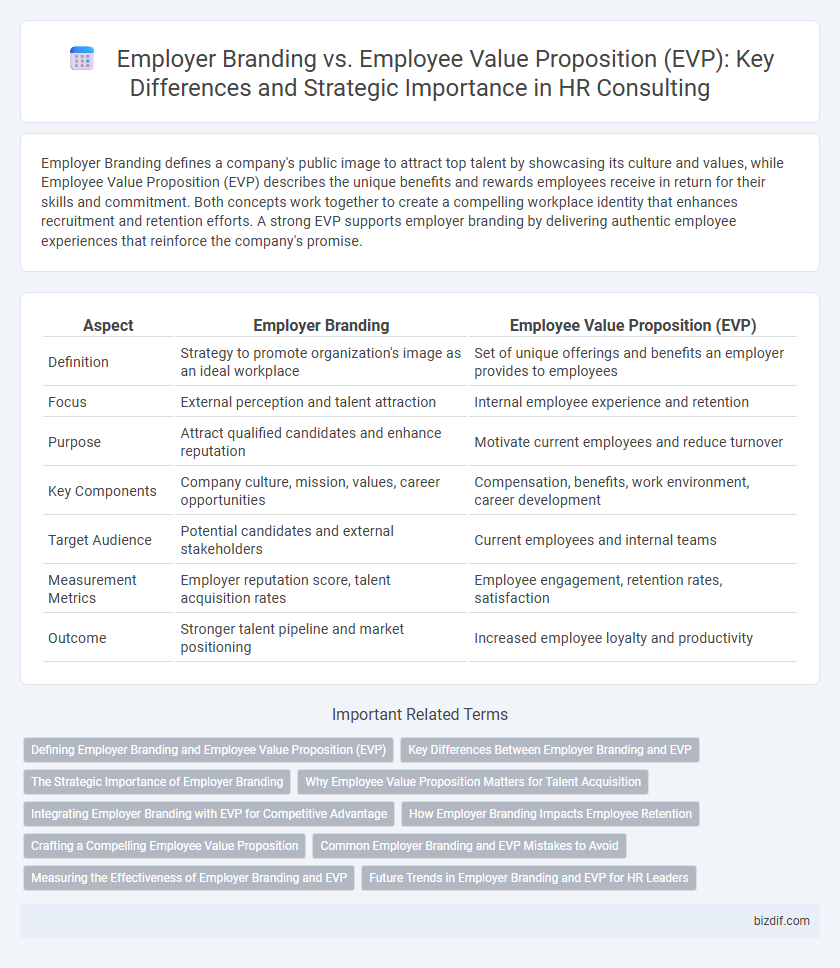Employer Branding defines a company's public image to attract top talent by showcasing its culture and values, while Employee Value Proposition (EVP) describes the unique benefits and rewards employees receive in return for their skills and commitment. Both concepts work together to create a compelling workplace identity that enhances recruitment and retention efforts. A strong EVP supports employer branding by delivering authentic employee experiences that reinforce the company's promise.
Table of Comparison
| Aspect | Employer Branding | Employee Value Proposition (EVP) |
|---|---|---|
| Definition | Strategy to promote organization's image as an ideal workplace | Set of unique offerings and benefits an employer provides to employees |
| Focus | External perception and talent attraction | Internal employee experience and retention |
| Purpose | Attract qualified candidates and enhance reputation | Motivate current employees and reduce turnover |
| Key Components | Company culture, mission, values, career opportunities | Compensation, benefits, work environment, career development |
| Target Audience | Potential candidates and external stakeholders | Current employees and internal teams |
| Measurement Metrics | Employer reputation score, talent acquisition rates | Employee engagement, retention rates, satisfaction |
| Outcome | Stronger talent pipeline and market positioning | Increased employee loyalty and productivity |
Defining Employer Branding and Employee Value Proposition (EVP)
Employer Branding represents a company's reputation and image as an employer, reflecting how it is perceived by current and potential employees. Employee Value Proposition (EVP) defines the unique set of benefits and rewards an employee receives in exchange for their skills, capabilities, and experience. Together, these concepts shape talent attraction, engagement, and retention strategies within HR consulting frameworks.
Key Differences Between Employer Branding and EVP
Employer Branding defines the external perception of a company as an employer, shaping how potential candidates and the public view the organization's culture and values. Employee Value Proposition (EVP) centers on the internal promise made to employees, detailing the unique benefits, rewards, and experiences they receive in exchange for their skills and contributions. While Employer Branding targets recruitment marketing and talent attraction, EVP focuses on employee engagement, retention, and overall satisfaction.
The Strategic Importance of Employer Branding
Employer branding plays a crucial role in shaping a company's reputation as an employer and directly impacts talent acquisition and retention by highlighting organizational culture and values. A strong employer brand differentiates the company in competitive job markets, increasing its attractiveness to high-quality candidates. While the Employee Value Proposition (EVP) defines the unique benefits and experiences offered to employees, employer branding strategically communicates these elements externally to build a compelling brand image.
Why Employee Value Proposition Matters for Talent Acquisition
Employee Value Proposition (EVP) plays a crucial role in talent acquisition by clearly defining what employees can expect in terms of rewards, culture, and career growth, which directly influences candidate attraction and retention. Unlike employer branding, which shapes external perception, EVP delivers a genuine internal promise that aligns employee expectations with organizational offerings. This alignment enhances recruitment effectiveness by attracting candidates whose values resonate with the company's core purpose and workplace experience.
Integrating Employer Branding with EVP for Competitive Advantage
Integrating employer branding with the Employee Value Proposition (EVP) creates a cohesive narrative that attracts and retains top talent by clearly communicating an organization's unique culture and benefits. A well-aligned EVP strengthens employer branding by showcasing authentic employee experiences and company values, leading to increased engagement and reduced turnover. Leveraging data-driven insights to refine EVP and employer branding strategies enhances competitive advantage in talent acquisition and retention.
How Employer Branding Impacts Employee Retention
Effective employer branding enhances employee retention by creating a strong organizational identity that resonates with current and potential employees, fostering loyalty and reducing turnover rates. A compelling Employer Value Proposition (EVP) communicates clear benefits and workplace culture, aligning employee expectations with company goals, which strengthens engagement and satisfaction. Organizations investing in authentic employer branding strategies often see improved employee commitment, lower recruitment costs, and sustained competitive advantage in talent acquisition.
Crafting a Compelling Employee Value Proposition
Crafting a compelling Employee Value Proposition (EVP) involves clearly defining the unique benefits, culture, and career opportunities that an organization offers to attract and retain top talent. A strong EVP aligns with employer branding but goes deeper by addressing employee needs, motivations, and expectations to foster engagement and loyalty. Effective EVP development incorporates employee feedback, market research, and competitive positioning to differentiate the organization in a competitive talent landscape.
Common Employer Branding and EVP Mistakes to Avoid
Confusing Employer Branding with Employee Value Proposition (EVP) often leads to inconsistent messaging, as branding targets external talent acquisition while EVP focuses on internal employee experience and retention. Common mistakes include overpromising employer benefits without delivering, which damages credibility, and neglecting to tailor EVP to diverse workforce segments, resulting in lower engagement and recruitment effectiveness. Avoiding vague or generic statements and failing to align both strategies with actual corporate culture are critical to building a strong and authentic employer brand.
Measuring the Effectiveness of Employer Branding and EVP
Measuring the effectiveness of Employer Branding and Employee Value Proposition (EVP) involves analyzing key performance indicators such as employee engagement scores, retention rates, and candidate quality metrics. Surveys and feedback tools help assess alignment between employee experiences and brand promises, while social media sentiment and employer review site ratings provide insights into external perceptions. Benchmarking against industry standards and tracking recruitment funnel metrics ensure continuous optimization of talent attraction and retention strategies.
Future Trends in Employer Branding and EVP for HR Leaders
Future trends in employer branding emphasize authentic storytelling and personalized employee experiences to attract diverse talent pools. Advanced analytics and AI-driven insights are enhancing the development of Employee Value Propositions by aligning them closely with evolving workforce expectations. HR leaders must integrate sustainability and inclusivity into both employer branding and EVP strategies to stay competitive in the dynamic talent market.
Employer Branding vs Employee Value Proposition (EVP) Infographic

 bizdif.com
bizdif.com